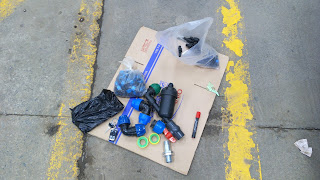It can, however, be problematic if not tended to well.
One of the problems that comes with the drip lines is clogging of the drip line (Drip lateral or drip tape). As a saying going, prevention is better than cure and here is how to prevent clogging of your drip lines.
1. Installing a water Filter
 |
| A picture of a one inch water filter and several drip irrigation accessories being packaged to be sent and installed in Rusinga Island. . |
Most of the drip irrigation kits use gravity to feed the drip lines from an over head tank. Water from the tank flows to through the installed pipes (main pipes and sub main pipes) into the drip lines.
If a water filter is installed in between the tank outlet and the driplines,it filters out any debris which could have clogged your drip line.
Having installed a water filter is not all. You must be flushing the water filter at least once a week. This removes all the filtered dirt from the filter and enhances the filtration and extends the life span of your filter.
2.Flush Drip Lines Every Season
 |
| Capsicumdoing well under drip irrigation. (Installed By Dripsol Company, www.dripsol.com) |
Drip lines saves not only time spent on farm watering crops but also saves labour costs. At the onset of every season, its advisable to open the dripline ends and flush them (let water freely flow). This washes off any fine perticles which could have bypassed the water filter the previous season. If not flushed out, the particles end up clogging your driplines.
3. Regular System Flush out
 |
| Farmers being trained on hot to irrigate using Dripsol Company's Drip Kits in Njoro, Nakuru, Kenya. |
Your drip irrigation system will require system
flush-outs on at least a monthly basis, and more depending on the type
of water that’s flowing through the tubing. Non-potable water contains
more particles and can more easily clog filters and drip emitters. This is achieved by having a wash-out at the end of the main pipe.
By D.W.G
By D.W.G




